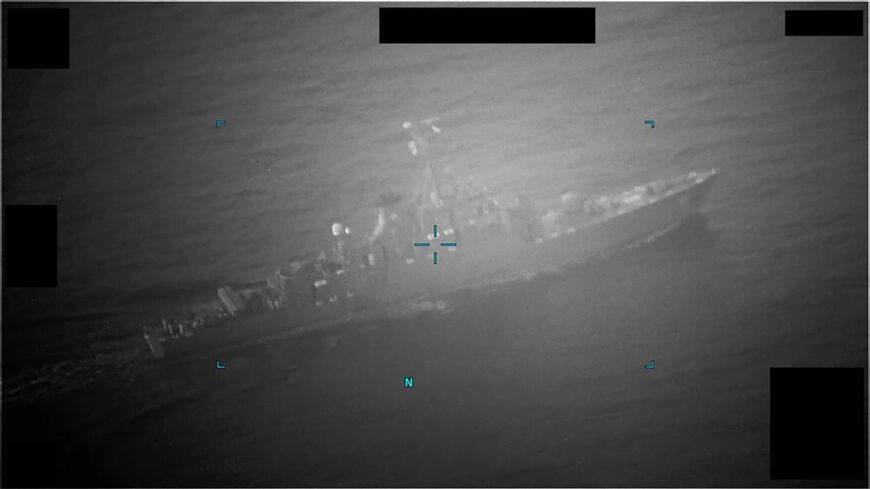Iran’s navy aborted attempts to seize two commercial oil tankers near the Strait of Hormuz after the US Navy responded in the hours before dawn on Wednesday, according to US military officials, in the latest sign the tanker conflict is heating up once again.
The US Navy’s Fifth Fleet based in Bahrain dispatched a destroyer and surveillance aircraft around 1 a.m. local time after detecting an Iranian ship pursuing the Marshall Islands-flagged oil tanker TRF Moss in international waters in the Gulf of Oman, a US official told Al-Monitor.
The Iranian ship left the area after the destroyer USS McFaul accompanied by a US P-8 Poseidon surveillance aircraft and MQ-9 reaper drone arrived at the scene, the Navy's Fifth Fleet said.
Some three hours later, the McFaul responded to a distress call by another commercial tanker, the Bahamian-flagged Richmond Voyager, as it was being pursued by a different Iranian navy vessel further south some 20 miles off the coast of Muscat.
Personnel onboard that Iranian ship fired small arms and crew-manned weapons at the Richmond Voyager as it sought to get away, the US official said.
No one was reported injured but the gunfire struck near the tanker crew’s living quarters, the official said, adding that the damage did not inhibit the ship’s operation. The Iranian vessel broke off pursuit after the USS McFaul approached the area, the official said.
Why it matters: Reports of Iran attempting to seize commercial fuel tanker ships in the Gulf have picked up in recent months as the United States resumed its own seizures of sanctioned Iranian oil and gas shipments abroad.
In April, the Iranian navy seized a Chevron-chartered tanker carrying petroleum from Kuwait to Houston, Texas. That seizure came after the US Justice Department successfully pressured the owners of another Marshall Islands-flagged tanker, the Suez Rajan, to surrender its Iranian petroleum cargo to the United States instead of delivering it to China.
Iran’s naval forces pursued but failed to catch the Suez Rajan earlier this year as it rerouted toward the east coast of the United States, where it was scheduled to be offloaded as part of a lawsuit filed on behalf of families of the victims of the Sept. 11 attacks, the Financial Times reported.
A bipartisan group of lawmakers urged the Biden administration in April to enable the Department of Homeland Security to go after sanctioned Iranian oil and gas shipments after Iran’s oil minister said his country’s petroleum exports had reached their highest levels since 2018.
It remains unclear whether Wednesday’s attempted seizures were related to any new efforts by the United States to confiscate Iranian oil and gas.
Iranian forces have attempted to seize at least five oil tankers and has interfered with 15 commercial vessels in the Gulf region over the past two years, the US Navy has said.
Iran has also been accused of launching precision drone attacks on vessels linked to Israeli billionaires amid a wider covert conflict between Iran, the United States and Israel.
The United States and maritime coalition partners increased the frequency of patrols in and around the Strait of Hormuz in May after Iranian forces seized two commercial ships in less than a week.
The big picture: Iranian attacks on commercial shipping and on neighboring states increased significantly after the Trump administration withdrew from the multinational nuclear accord with Tehran and imposed punishing economic sanctions in 2018.
Critics of the 2015 nuclear deal argued it did nothing to stop Iran from arming and training a broad array of militias across Iraq, Syria and Yemen with drones and precision missiles.
The Biden administration’s efforts to rejoin the accord have fallen short, but US officials have continued to engage with Iranian negotiators in pursuit of restraint on Tehran’s nuclear enrichment and a halt to attacks on American troops in the region.
Know more: The Biden administration is going on the defensive as Republicans in Congress demand answers over reports that top Iran envoy Rob Malley was placed on unpaid leave amid an internal inquiry into his handling of classified material.








